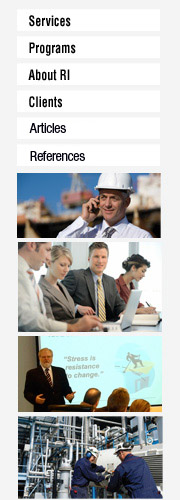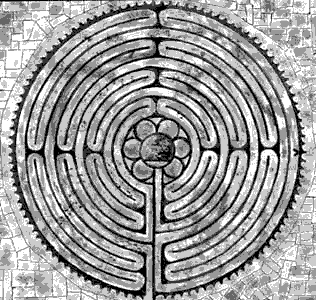
|
T.E.A.M. DEVELOPMENT with Rob and Stephen TOGETHER, EVERYONE ACHIEVES MORE | |
| 5 Fundamental Principles, 4 Key Elements and 4 Basic Processes that make certain your team development initiative works. Download FREE article: What Makes TeamBuilding Work (pdf) 5 Basic Principles in Team Development 1. What happens back at work as a result of the team development is more important than what happens during the team development session itself. 2. Functional teams talk about their dysfunctions. Dysfunctional teams do not. An important goal of a successful team development program is for participants to increase their skill, talent and comfort in having ongoing discussions about how their team is functioning, especially when they are “dysfunctioning.” 3. People are more willing to participate in a team development event they see as designed in response to their expressed concerns (as opposed to management’s perceptions of what employees need). See 4. Most people need to have their own concerns understood first, before they are able to understand the concerns of another. 5. Most conflicts are resolvable because they are the result of misunderstandings. In such cases, agreements already exist but they are not recognized. Four Key Elements to Designing a Successful Team Development Event 1. Employee Concerns Understood: Team members will be more motivated to be actively involved in a teambuilding event when they believe their concerns are sincerely understood by their leaders. Successful teambuilding leaders facilitate processes in which the team members actually feel understood. 2. Engaging Activities: Participants are much more intrinsically motivated to participate in activities that actively engage them in addressing issues that can make a significantly positive result in the team. |
Our Approach To Team Development  Click on logo to download Sample Report 4 min Video on Our Approach Video References from Clients Dennis Peterson, President Lockwood, Andrews & Newman, Inc Sue Burnett, CEO Burnett Staffing Doreen Wise, CEO Medical Research Consultants 16 Team Development Points To Remember |
|
3. Customized Activities: Activities for the sake of activity or purely for fun can be a waste of time. Icebreakers and activities must be customized to reflect the current circumstances of the team in order to produce real insights and results in behavior. 4. Employees Willing To Risk: Any time a person moves from what is familiar to what is new there is an emotional barrier of uncomfortable feelings. The facilitator must encourage people to move through the discomfort by giving them opportunities to take reasonable risks to openly discuss the team’s methods of functioning. Four Basic Processes in Team Development The success of any team building event depends on four primary processes. 1. Preparation of Facilitator and Participants: Through interviews with key players and surveys of all team members, the facilitator must identify the formal and informal leaders and those who are most resistant to the teambuilding process, along with major employee concerns (hot buttons) and conflicts (land mines). When participants perceive their concerns and conflicts being identified in preparation for a teambuilding program, they reduce resistance to participate and increase motivation to address concerns and conflicts. Potential “land mines” should be identified through this diagnostic preparation process in order to facilitate “setting them off” in a structured and supportive manner that allows for resolution of the conflict. Most people are apprehensive about taking this risk, but success is likely since the majority of conflicts are a result of misunderstandings. 2. Trust in Facilitator: Team members must trust the ability of the facilitator(s) to make sure employee needs and concerns will be fairly represented. People are naturally motivated to deal with issues when they believe there is a reasonable chance of being successful. This hopefulness of success begins in the preparation process when trust is built between participants and facilitator. 3. Facilitator skill: The facilitator must be skilled in reading what is going on “in between the lines” of what people say, and in dealing not just with what people say but with what they are not saying. This is a key to guiding participants to bring their concerns out in the open where issues can be more clearly addressed. The facilitator must create a sensitive balance between clarifying, supporting, challenging, and stepping out of the way to let the group’s momentum take over. Being structured in having a plan and also flexible in being able to adjust to unforeseen occurrences is an important balance for a facilitator to maintain. 4. Follow-up: Team building activity discussions should conclude with decisions of specific actions that will be taken to put any changes into practice, how progress will be measured, and assignments and dates to review this progress. CUSTOMIZATION MIGHT BE NEEDED
Following is a description of a generalized training program in how to work better as a team. But if you already have an intact team, a group of people who have a history of working together, then a more customized approach is more likely required.
A sample proposal describing RI's Four Phase Teambuilding Program is available. You can request a PDF copy by clicking here: Request Four Phase Teambuilding Program PDF.
Training alone is insufficient to address habits of dealing ineffectively with conflicts or a history of organizational dysfunction. However, significant progress can be made when team members are adequately prepared. RI provides a four-step process of preparation with evaluation/diagnosis, short technique-focused trainings, structured team-work activities guided by RI's skilled facilitators, and ongoing executive coaching. During these activities team members collaborate on identified work issues while practicing specific techniques to resolve conflicts and clarify decision making. SAMPLE PROPOSAL AND SURVEY A sample Internet accessed survey can be viewed by clicking here: Internet team functioning survey. References for our success in this area are available on our RI Reference Page. COURSE DESCRIPTION Individual success at work is becoming more dependent on the ability to work well with others. People are put into a group and call it a "team," but this label alone does not give the ability or knowledge to make the team effective. Performance evaluations now include "teaming," but few people understand the concept or have the skills necessary to succeed. Fortunately, this increasingly important knowledge is learnable. Your employees will learn how to work better together as a team in this engaging, entertaining and impactful program. They will learn how to function as a team, primarily by being better able to handle the inevitable disagreements which exist. They will realize that their personal success now depends on the success of others and they will have the tools to make that success a reality. COURSE CONTENT
Resource International 6119 Bankside Houston, TX. 77098, Phone: 713-305-1812 |
|


